TEA SHACK NEWS



In the fast-paced world of offshore energy, where the demands of the job are intense and safety is paramount, insights from seasoned workers like Dennis Rosemurgey, a painter, blaster, and fire proofer with 11 years of experience—eight offshore—are invaluable.
Following on from TSN Issue 2 and “Green Hats: An OIM’s Perspective”, Dennis shares his journey and reflections on what it means to work offshore as a Green Hat.
For Dennis, balancing ad hoc versus continuous offshore rotations is a mix of personal choice and job nature. “It’s great being on a rig for an extended time, but travelling between platforms also gives you varied experiences,” he says. He has worked on nine platforms, including one ship, with his average trip lasting around three weeks. The diversity of locations helps hone his skills and introduces him to new people.
Offshore work environments prioritise safety above all else, and for newcomers, the Green Hat policy
is crucial. For Dennis, this policy ensures inexperienced personnel are easily identifiable, allowing for extra supervision and smoother integration. He emphasizes, “It helps merge new personnel into existing teams and ensures everyone stays safe.”
Dennis offers advice for those new to offshore work: “When you’re wearing that green hat for the first time, you might feel like you stand out because you don’t know what to expect.” However, he assures that the green hat is a safety tool, not a symbol of inexperience. Dennis also encourages seasoned workers to help newcomers settle in and feel part of the team.
Among the platforms he’s worked on, Dennis holds EnQuest Magnus in special regard. “It’s the sense of community—everyone looks after each other,” he says. Spacious living quarters, quiet rooms, and plenty of activities make long stints offshore more comfortable. “There’s always something to do in the evenings, and it’s important to have space to relax after work.”
Despite his experience, Dennis acknowledges the stress of mandatory pre-mob inductions, particularly for those who aren’t tech-savvy. “If the induction gets thrown at you the day before, it can be overwhelming,” he admits. One induction took him nine hours. While Dennis understands the importance of these sessions, he suggests more standardization and preparation time to reduce stress.
Dennis believes better communication about the locations of Safety Reps onboard could enhance safety. While most platforms display boards with photos and names of safety reps, he suggests an improvement: “It’s OK having a picture on the board with a name, but unless you know where to find them, it’s not always useful. Have the picture next to the office where they sit or indicate their location clearly so when you need to talk to them, you know exactly where to go.”
Continue reading on page 2

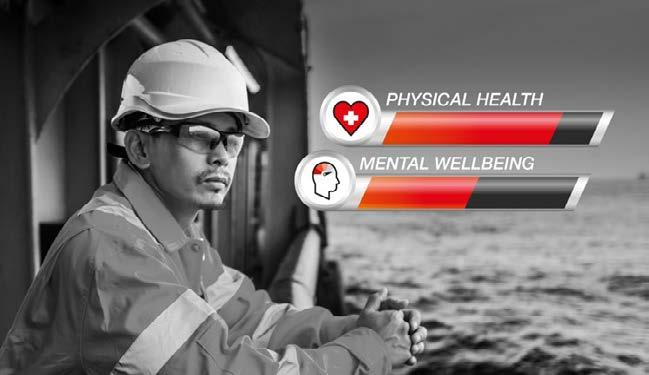
•
• Improve understanding of physical and mental wellbeing
•
• Increase awareness of environmental health impacts
•
• Improve communication and better understand your colleagues

6th November
Occupational Lung Disease and Respiratory Protective Equipment Awarenesss 09:00–12:30, Northern Lights Room, Beach Ballroom
13th November
Wellbeing Event - 09:00–16:30 Beach Ballroom, Aberdeen
14th November
Human Factors Quarterly Forum: Human Factors in Risk Assessment, 09:00–11:30, Step Change in Safety, 4th floor, Annan House, Aberdeen
24th November
Sunday Safety Session
Q4: Wellbeing and Work Environment, 15:00–16:00 - Online Event
Continued from cover page...
Offshore work isn’t the only place Dennis has applied his skills. One of his career highlights includes working at Manchester City’s football ground. “I did spend most of my time on the roof or in a cherry picker helping the riggers set up systems for rope access but also managed to walk anywhere inside the stadium which not many people get to do,” he recalls.
Reflecting on his career, Dennis highlights the importance of building confidence for Green Hats. “We’re all people at the end of the day, and just because we work in a maleorientated industry doesn’t mean we have to act tough.” Offshore work may be challenging, but with the right support and team camaraderie, anyone can thrive.
Our mini-series on sleep, by Emma Cook, Purely Balanced
Arriving at your place of work to find you are either on night shift or that you’re sharing a cabin with someone on the same shift can be difficult. We can’t change these things but here’s some ideas to help aid your sleep pattern and routine:
1. Try wearing an eye mask with Bluetooth headphones. These are PEDs (Personal Electronic Devices) and not all are helicopter baggage-friendly, so check before you buy and fly!
2. Download some ‘binaural beats delta wave’ which are designed to help your brain achieve a deeper relaxation state. This should reduce the external shock to the brain when snoring, or the door opening and closing which can be constant when you’re sleeping after a nightshift.
3. Snoring can sometimes be prevented by sleeping more upright. Wearing snoring strips can help, and eucalyptus/olbas oil dropped onto your pillow or chest can help open airways too.
Sleep apnea is more common than you might think, with many people not realising they have it. It is when breathing stops and starts during sleep and often causes loud snoring. If you think you might have sleep apnea, you should visit your GP. Losing weight can help, as can pillows called ‘bed wedges’ which keep your upper body elevated. This is a good alternative to help you sleep better and those you are sharing a room with.
Insomnia is another sleep disorder but, before you self-diagnose this, please try the 5-point routine (TSN Issue 6, April 2024) and nap when you can and it’s safe to do so because your body needs rest.
The Step Change in Safety Wellbeing Survey in collaboration with the IADC North Sea Chapter and the Marine Safety Forum, opened on 24th June 2024, and ran until 26th August 2024. The “Where’s Your Head At” survey aimed to gather vital data on the physical and mental wellbeing of the energy sector workforce.
Recognising health’s critical role in workplace safety, this survey sought to understand the current state of employee wellbeing and pinpoint areas where additional support may be needed. Thank you to everyone who participated! 1300 responses were received, along with 2500+ comments from members
of the workforce, ranging from offshore workers to contractors.
Executive Director of Step Change in Safety, Craig Wiggins, highlighted the significance of the initiative, “The wellbeing of our workforce is paramount. By launching and analysing this survey, we aim to understand the current state of wellbeing within the energy industry and identify key areas where we can provide additional support.”
The survey covered aspects such as physical health, mental wellbeing, workplace environment, and job satisfaction and was open to all employees in the sector.
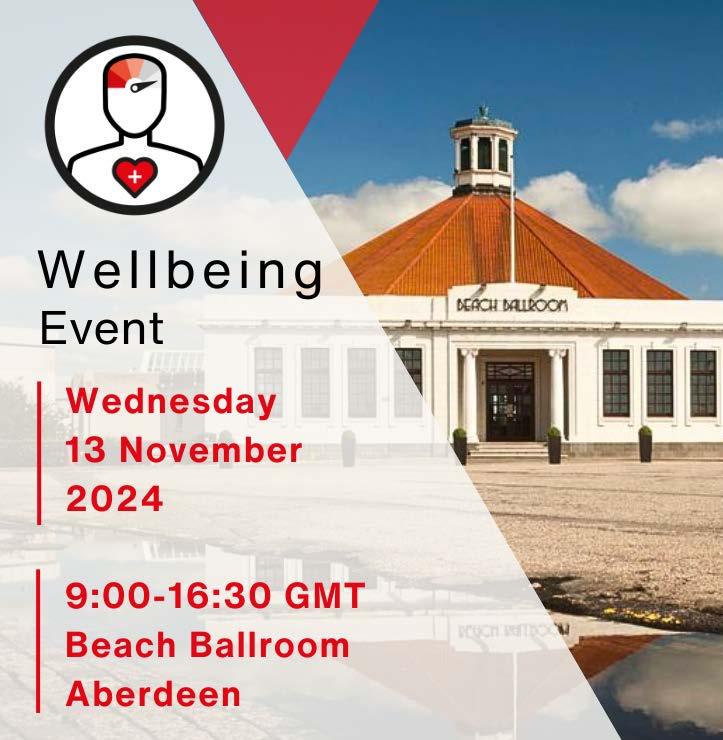
Positive Areas:
• Supervisors and managers feel confident discussing mental health with their teams
• Relevant training addresses workplace health risks
• Employees prioritise health when making nutrition choices at work
Areas of Concern:
• Insufficient social activities and resources within workplaces
• Work roles or environments affecting sleep
• Workload and hours negatively impacting health and wellbeing
Co-chair
the Wellbeing Group, also underlined the importance of participation, pointing out that a significant portion of the workforce faces wellbeing issues. “The data collected will help us develop strategies to address these challenges and promote a stronger culture of safety and care across the industry.”
Further updates on the survey will be shared throughout Q4 as we embark on our Wellbeing and Work Environment theme.
This full-day event is a mustattend for anyone in the energy sector committed to improving health and wellbeing at work and in life.
The event will feature engaging presentations, interactive stalls, and expert insights covering essential topics such as Physical Health, Nutrition and Lifestyle, Work Environment, Financial Wellbeing, and Emotional and Mental Health. It’s a fantastic opportunity to learn how to create a healthier, safer, and more productive work environment while taking care of your overall wellbeing.
Whether you’re focused on better nutrition, managing
Email: editor@teashack.news www.stepchangeinsafety.net/teashack-news
stress, or improving your work-life balance, the Wellbeing Event offers valuable information to support your journey. Plus, you’ll have the chance to connect with industry professionals, explore innovative solutions, and leave with practical strategies for both your professional and personal life.
This event is free to attend, but spaces are limited, so don’t miss out on this chance to prioritise your wellbeing. Register today via the following link: Wellbeing Event Tickets.
Take a step towards a healthier, safer future – see you at the Beach Ballroom!
For work activities for which it is foreseen that employees will need to wear RPE (Respiratory Protective Equipment), the employer must ensure RPE is both adequate and suitable:
Adequate – It is right for the hazard and reduces exposure to the level required to protect the wearer’s health.
Suitable – It is right for the wearer, task and environment, such that the wearer can work freely and without additional risks due to the RPE.
Alongside this, employees should be provided with suitable instruction and training on the types of RPE and factors that may influence the performance and protection that the RPE offers.
For tight-fitting RPE, ACOP L5 (Para 160) requires wearers to be face-fit
3
CLEAN SHAVEN
3 MOUSTACHE
Facial hair is known to interfere with the sealing surface of the mask to the wearer.
A recent study by the Health and Safety Executive (RR1052) outlines this, showing that as facial hair grows, the protection offered by a tightfitting mask reduces. The reduction in protection is very unpredictable and is different for individual wearers and masks. Protection can be significantly reduced where stubble is present. A person who is ‘unshaven’ will mean they have not shaved within the previous 8-hour period prior to the work shift. Protection will generally
Neil Grace, Principal InspectorIndustrial Hygiene at Health and Safety Executive (HSE)’
tested, using a suitable method, by a competent person. Wearers must also be clean-shaven in the area of the face seal when using tight-fitting RPE.
There was an HSE bulletin that caused some industry confusion which stated…“You should note that under health and safety law, employers cannot require workers to be clean shaven; this is because alternative RPE to tight-fitting respirators are available and can be used instead…”
Whilst in many work situations this statement is correct in that the employer should always consider alternative options to tight-fitting RPE such as loose-fitting powered assisted personal respirators (PAPR’s) and further consider factors that may influence the wearing of RPE (such as personal

circumstances i.e medical, religious reasons etc), in terms of offshore ERT/ firefighting this statement is not practicable.
This is due to ERT members being equipped and required to wear self-contained breathing apparatus (SCBA), which is classed as tight-fitting RPE and as mentioned above under COSHH and relevant guidance (HSG53 and INDG479) requires face fit testing and the wearer clean-shaven.
RPE can’t protect the wearer if it leaks, and a major cause of leaks is poor fitting of RPE.

3
7
worsen as facial hair grows. It is therefore important that wearers should be clean-shaven, not only for a fit test but whenever they wear a tight-fitting mask at work.
For offshore ERT/firefighting, we have an information sheet which should assist you further: Info sheet 03/2013 - Fit testing respiratory protective equipment for escape and emergency response on offshore installations (hse. gov.uk)
Specific action for duty holders is to ensure face fit testing is completed as required by COSHH and implement a clean-shaven policy for all users
7
7 FULL BEARD
of tight-fitting RPE. The duty holder should ensure that this policy is routinely managed and enforced across all offshore assets.
The right to have facial hair is often cited as a reason for not being cleanshaven at work. However, this needs to be balanced against the requirement under the Health and Safety at Work, etc Act 1974.
This requires employees to follow the training they have received, take care of their own health and safety and cooperate with their employer on health and safety.
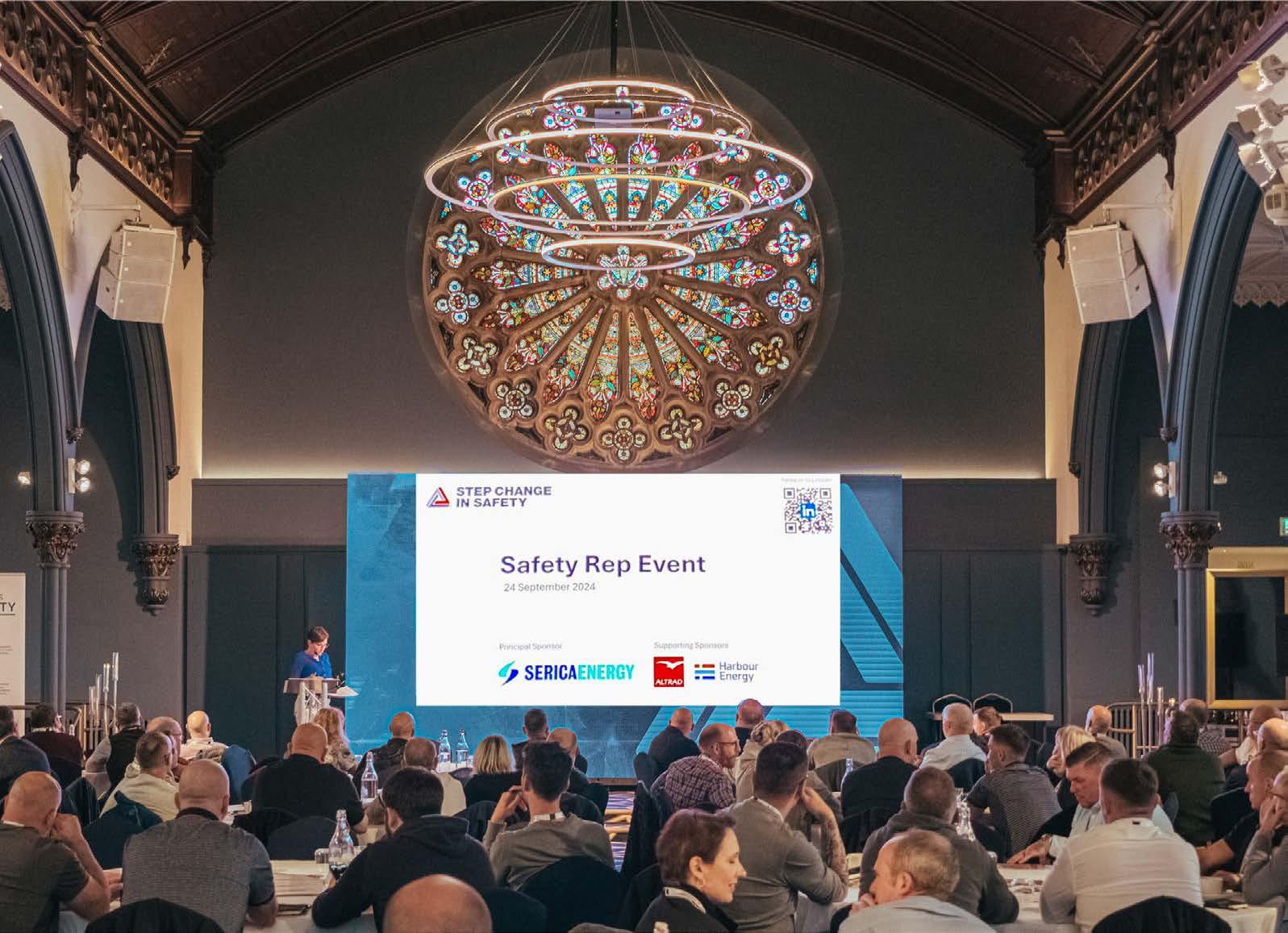
We welcomed over 170 attendees to our back-to-back Safety Reps and Site Managers events at Aberdeen’s Union Kirk - a fantastic turnout and thank you to all who attended. The incredible collaboration, engagement, and leadership demonstrated was both energizing and inspiring!
Over both days, a range of crucial topics were covered, from process safety and wellbeing to decommissioning and major accident learnings, alongside thoughtprovoking presentations from two inspirational Safety Reps (Kevin Clark & Paul Brumby). Throughout, a clear
Across
5. The ones carrying out the task? (9)
7. Carry out a poll (6)
8. Act of becoming betrothed (10)
9. Help out, assist (7)
10. Group representing interests of a demographic (9)
11. HSWA is _____ years old in 2024 (5)
theme emerged: the immense value of sharing, learning, and connecting with one another.
A big thank you to everyone who attended, as well as our fantastic hosts, presenters, sponsors and AV team. Your contributions made these events a huge success.
While we’ll be sharing insights from the event through social media and our website. In the meantime, this highlights reel link captures the spirit of these two insightful days perfectly!
Principal Sponsors:

Hosts:
Stuart Watson, Serica Energy
Pete Baker, TAQA
Dale Checksfield, Harbour Energy
Presenters:
Andy Collins, bp
Mike McAreavey, BW Offshore
Sam Long, Decom Mission
Fiona FitzGerald, Evolve Consulting
Bob Egan, HSE
Kevin Clark, Serica Energy
Graeme Wylie & Renata Halim, Shell
Steph Sunley, Spirit Energy
Simon Murray, Spirit Energy
Craig Wiggins & Gillian Simpson,
Step Change in Safety
Craig Donathy, TAC Healthcare
Pete Baker, TAQA
Paul Brumby, Wood


1. Knowledge of, attention to (9)
2. Health and safety _________ (9)
3. Getting better (11)
4. Wickedy, wickedy wild wild (4)
6. Undertaking academic work (8)
12. There’s no I in it (4)

by Dr David Leiper, Chief Medical Officer at Harbour Energy, and Offshore Safety Awards 2024
When I joined Harbour Energy in late-2021 to lead the company’s Occupational Health team, my remit was twofold: to provide ongoing medical advice and support to the business to manage the ongoing challenges of COVID-19, and to lay the foundations for a more comprehensive, long-term health strategy.
This strategy – which draws upon organisational health data, colleague feedback, existing benefits and our company values – was launched in 2022. It aims to empower colleagues to take ownership of their wellbeing through a holistic and proactive approach that encompasses mental, physical, social, environmental and financial health.
Key components include personalised health checks, or ‘health MOTs’, that assess vital functions such as lung, kidney and liver health, offering early detection of serious conditions such as cancer or Type 2 diabetes. These checks come with the option for followup consultations with GPs, offering personalised guidance and reassurance.
Alongside these health checks, we run a year-round program of activities, addressing topics including hydration, posture, mindfulness, meal planning, and sleep health. These initiatives have been met with enthusiasm across the organisation, particularly from offshore employees, and are regularly evaluated to ensure their continued effectiveness.
The company also offers private cognitive diagnostic, or workplace needs, assessments to all colleagues and core contractors, with an inclusive approach being taken to extend these resources to contractors working across our offshore assets and onshore offices.
Leadership endorsement and participation have been integral to the implementation of the strategy; reinforcing the importance of prioritising health and wellbeing. Our various internal communication channels and employee resource groups also provide opportunities for us to disseminate information, share best practices and foster a collective sense of responsibility.
In place now for around 20 months, the strategy has already demonstrated its effectiveness, with early results showing improved health metrics and widespread positive feedback.
A high participation rate – 70% of eligible employees – took part in personal health checks in 2023, with six employees receiving early cancer diagnoses thanks to these screenings. Significant health improvements between 2022 and 2023 have included a 12% reduction in colleagues with elevated blood pressure and a 2% reduction in obesity. In these areas, we have managed to halt an increasing trend and will continue to work towards further reductions.
We have also trained over 100 mental health first aiders and have observed a reduction in mental health-related medevacs from offshore platforms, from 10% of all medevacs to just 2%.
Through leadership endorsement, ongoing communication, diverse wellbeing offerings and close case management, Harbour Energy has successfully integrated health-conscious practices into its workplace culture, with positive and sustainable outcomes across the organisation.
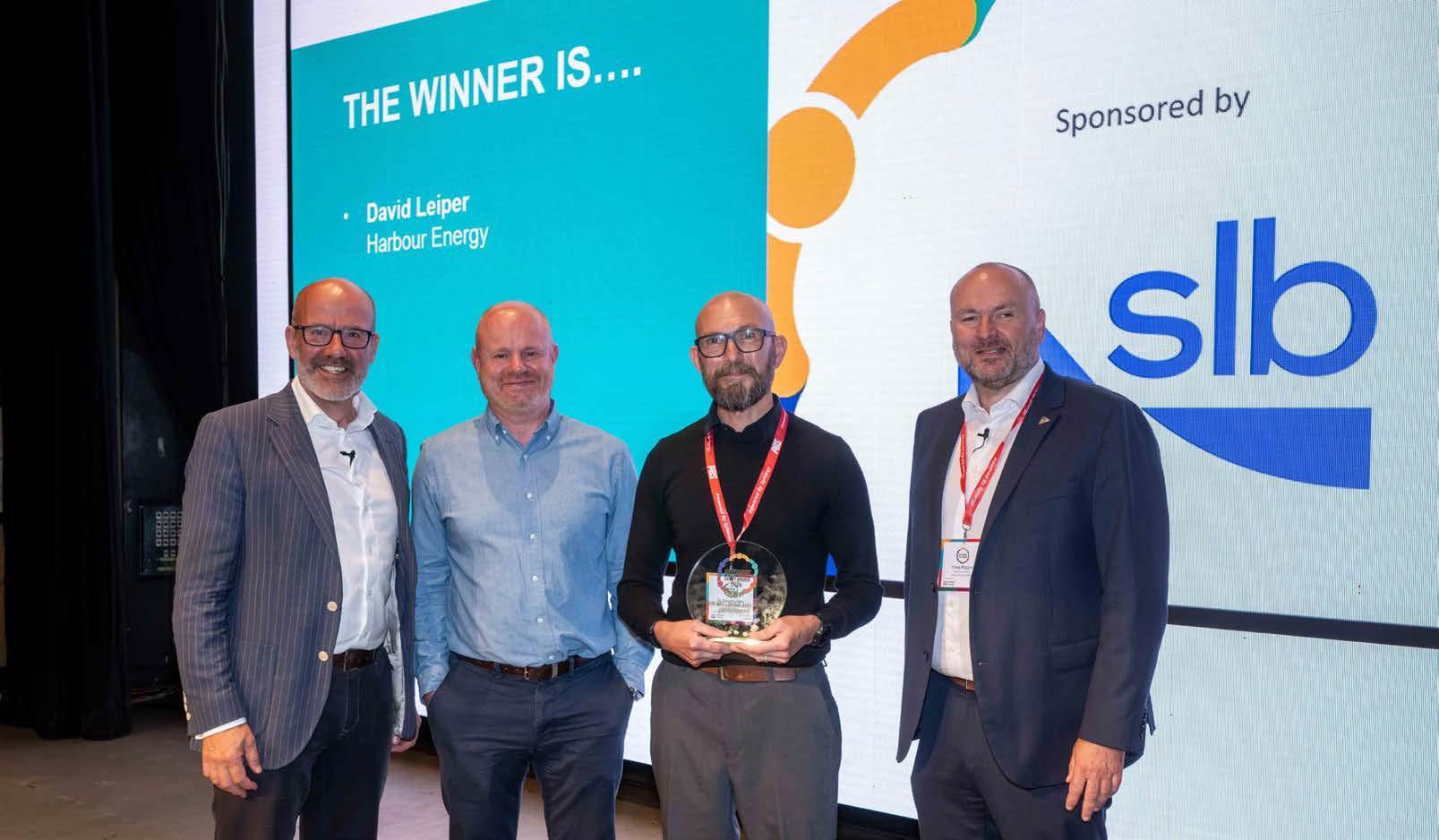
Email: editor@teashack.news www.stepchangeinsafety.net/teashack-news
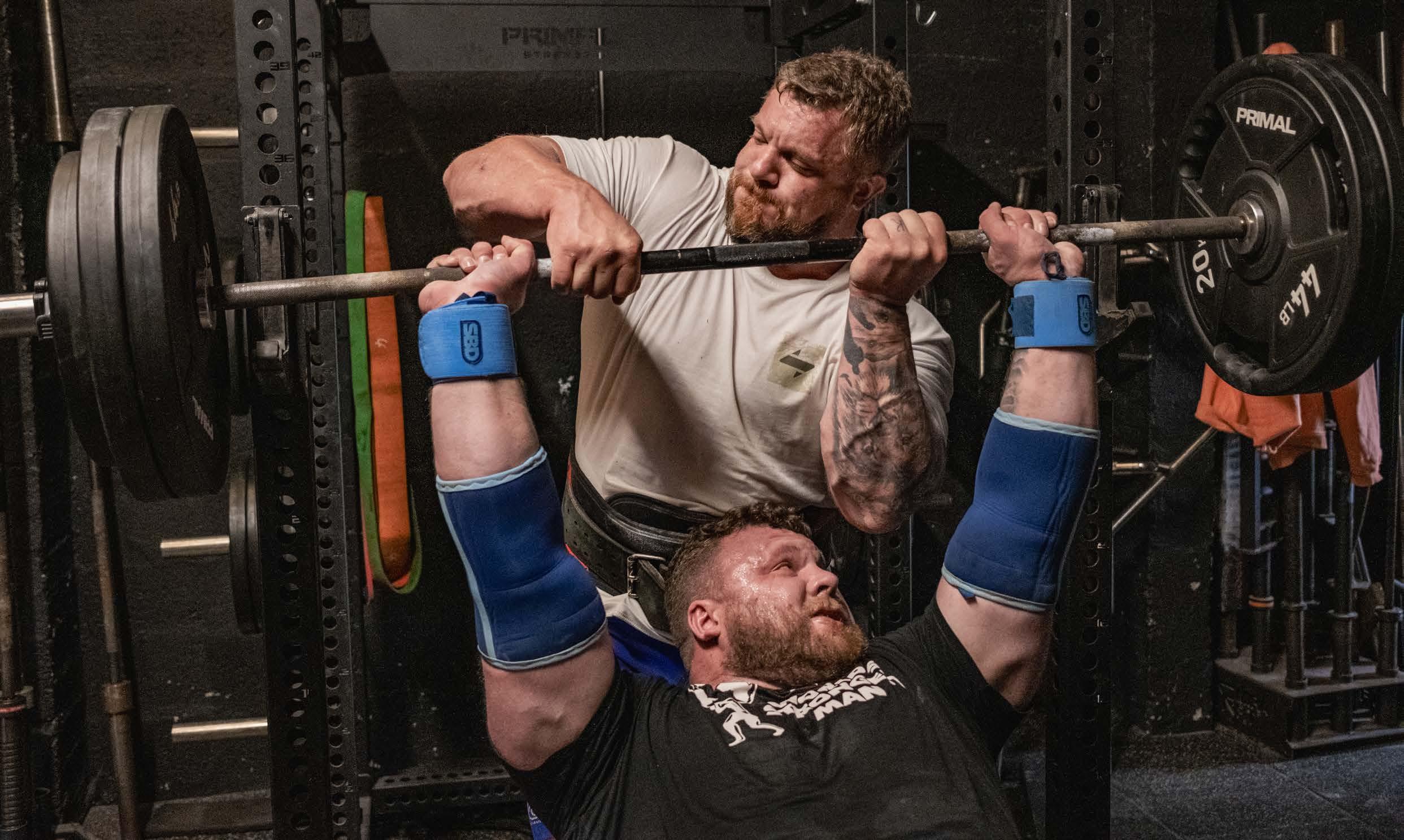
Working in offshore environments is often mentally and physically demanding. With long hours, harsh conditions, and the challenge of being separated from loved ones for extended periods, maintaining both physical and mental well-being becomes a priority. As Europe’s— and the world’s—strongest men, we, the Stoltman Brothers, know a thing or two about facing extreme conditions. Having spent years competing on global stages where mental fortitude is just as important as physical strength, we want to share our thoughts on handling the pressures of offshore work, especially when it comes to maintaining your mental health.
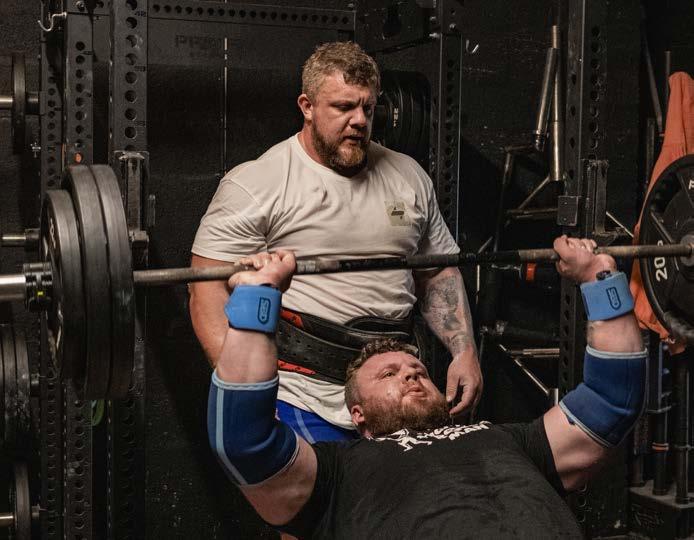
Offshore workers often deal with isolation, fatigue, and unpredictable weather. You’re away from home for weeks or even months, stuck in tight quarters with a small group of people, and often, the work can feel monotonous or stressful. Add to that the pressure of safety concerns and the physical demands of the job, and it becomes easy for mental health to take a back seat.
For us, competing in Strongman competitions is similar in many ways. We face intense physical challenges, but the mental aspect is just as crucial. Staying focused, managing stress, and coping with fatigue all play into whether we succeed or fail, just like it does in the offshore world. The key, as we’ve found, is having the right mindset and a few strategies to help manage the pressures.
One of the best ways to maintain mental well-being offshore is to develop a routine. Routines provide structure, which can help mitigate feelings of uncertainty or isolation.
Even when working long shifts, having a routine around when you wake up, eat, and exercise can bring a sense of normalcy.
Tom: “During competitions, I always stick to a strict routine. This helps me stay focused and grounded, no matter how intense the situation gets. Offshore workers can benefit from doing the same. A structured day helps the mind feel more at ease.”
Physical health and mental health are deeply connected. Exercise releases endorphins, the body’s natural stress relievers, which can help combat feelings of anxiety or depression. Whether it’s a quick workout in your quarters, yes you can workout in the smallest of spaces! or a jog on the treadmill in the onboard gym, staying active helps boost your mood and keeps you mentally sharp.
Luke: “When we’re not competing, we still train every day. It’s not just about maintaining our physical strength, but our mental strength too. If you can, find ways to move your body every day. Even short bursts of physical activity can make a big difference.”
Luke is an advocate of cold water therapy, now we are not asking you to go for a dook in the North Sea (please don’t do that!) but try a short, sharp burst of cold water from your morning shower and you will reap the benefits including reduced muscle pain and stiffness, improved cardiovascular health, mental clarity, and boosting of the immune system. Luke is very passionate about this being a key for his mental health, as well as consistency in doing the small things well every day – eating well, training, being active and sleeping well.
One of the toughest aspects of offshore work is being away from family. Maintaining relationships with loved ones is critical to mental well-being. Use any opportunity to call or video
chat with family and friends, and make sure you let them know how you’re feeling. A strong support system can make all the difference.
Tom: “We spend a lot of time on the road for competitions, but we always make time to call home. It keeps us grounded and reminds us why we do what we do. Offshore workers should take full advantage of modern technology to stay connected.”
Just as in a competition, working offshore means you’re part of a team. Lean on your colleagues when you’re feeling overwhelmed and be there for them too. Supporting each other is essential in maintaining a positive environment. Sometimes, just talking to someone who understands your situation can make all the difference.
Luke: “Strongman competitions may seem like a solo endeavour, but there’s always a team behind us—whether it’s
coaches, family, or fellow competitors. Offshore workers should remember they aren’t alone in this. Building strong relationships with your teammates helps build resilience.”
Offshore work is tough, but with the right mental attitude and strategies, you can not only survive but thrive in these environments. Mental health is as important as physical health, so don’t hesitate to invest time in yourself. Routine, exercise, connection, and teamwork are key pillars that can help keep your mind sharp and spirits high, no matter how rough the waters get. Remember, strength isn’t just about lifting heavy things—it’s about lifting each other up when times are tough. Take care of yourself, and stay strong!
Tom & Luke Stoltman World’s Strongest Brothers stoltmanbrothers.com/pages/about

Temperature changes and their impact
One of the most significant shifts in winter offshore is the drop in temperature. Depending on the location, temperatures can plunge to extreme lows, making tasks more challenging, particularly for workers exposed to harsh winds while working outside.
To combat these risks, it is essential to wear thermal, moisture-wicking clothing in layers.

Working offshore is a demanding job, but the challenges intensify during the winter months. The colder season brings more than just physical changes – it affects mental well-being, family relationships, and how one adjusts to reduced daylight hours. This article explores some of the key factors involved and offers tips to help workers stay safe, healthy, and resilient.
Monitoring local weather forecasts and adhering to safety protocols, such as limiting exposure time outside, can help prevent weather-related health issues.
tackling
Winter’s shorter days pose another challenge for offshore workers. Reduced daylight can disrupt the body’s circadian rhythm, leading to fatigue, decreased alertness, and difficulty concentrating. This shift can affect work performance and safety, as well as general well-being.
To offset this, maximise your exposure to natural light. Artificial lighting
that mimics sunlight can be used to regulate sleep cycles and boost energy. Creating a consistent sleep schedule and maintaining a healthy diet rich in vitamins and nutrients can also improve mental alertness and mood.
Lack of sunlight in winter months can also trigger Seasonal Affective Disorder (SAD). This form of depression is linked to changes in exposure to daylight and can lead to symptoms like low energy, irritability, trouble sleeping, and feelings of hopelessness. Regular exercise, mindfulness practices, and social interaction can help mitigate the effects of SAD.
Offshore facilities provide mental health support, so don’t hesitate to reach out if you feel overwhelmed.
For many, the festive season is a time to reconnect with family and friends. However, offshore workers may spend Christmas away from their loved ones, leading to feelings of loneliness and homesickness. The emotional toll can be significant, especially as colleagues discuss plans for the holiday season.
To cope, it’s important to stay connected with family through regular communication, whether via video calls, messages, or emails. Platforms like Zoom or Skype allow for virtual family gatherings, helping to bridge the gap. Bringing small reminders of home, such as family photos, can also help create a sense of connection and comfort. For those offshore during Christmas, organising small celebrations with colleagues can foster camaraderie and make the experience feel less isolating.
Email: editor@teashack.news

Winter offshore work presents a unique set of challenges, from extreme temperatures and limited daylight to the emotional strain of being away from home during the holidays. Staying warm, keeping a positive mindset, maintaining strong connections and reaching out for support when needed are key during the winter season offshore.
www.stepchangeinsafety.net/teashack-news
Watch member company TAQA’s ‘Walking is Working’ video resource for further hints and tips on how to manage winter working: www. stepchangeinsafety.net/resources/ walking-is-working/


As the UKCS continues to age, decommissioning becomes increasingly important. Our ability to extend life of assets and production reaches ever growing challenges, including technical integrity, profitability and carbon footprint.
With time, all offshore and onshore assets will cease production and have to be safely and effectively decommissioned. Whilst this may appear to be a negative outcome, it is actually an extension of asset management and an opportunity to create further employment and recycle materials. Crucially, it is also a means of retaining skillsets as the Energy Transition accelerates and the renewables sector grows.
The UK is a pioneer in oil and gas decommissioning, however despite this significant - and still growingexperience base, decommissioning remains an activity with potential to harm people and the environment. Assets that require decommissioning are usually several
Email:
decades old, with complex histories and incomplete datasets. Sealing the reservoir and separating it from the asset requires specialist skills. Preparatory and removal works involve multiple cutting and lifting scopes, whilst final dismantling and recycling can be unpredictable due to hazardous waste inventories or structural concerns.
Safety remains a priority even after an asset has ceased production, which is why Decom Mission (a specialist Trade Association) and SCiS have committed to work together to establish a new Safety Network, using SCiS toolkits to collate and share Decom Safety Alerts. While Decom Mission has long placed safety as a priority, it is logical that SCiS is better placed to lead on this matter.
As presented at the SCiS Safety Rep event in September, (see page 5) it should also be remembered that decommissioning takes time and is a team effort. The announcement that an asset is to
be decommissioned does not result in immediate redundancies, as might be feared. Instead, it is the beginning of a process that typically takes 4-7 years to complete and requires the retention of personnel with knowledge of the asset, which is critical for project success. In addition, and as the Energy Transition accelerates, it is also important to note that decommissioning creates opportunities to retain skills for the future. Welders, operators, engineers, supervisors and others all have a role in decommissioning, which it is worth remembering is an international market worth $20bn per annum.
An entire career’s worth of projects face those who choose to take this up, possibly also opening doorways into the renewables industry of the near and far future.
For more information, please visit www.decommission.net
“I just need somebody to tell me that it’s not OK.”
These were the words of someone feeling utterly broken after their trip offshore where they had been subjugated to repeated verbal abuse, intimidation, and harassment. They were being bullied.
Sadly, bullying continues to occur across our industry – onshore and offshore. It is insidious and can be subtle so that those who are victims are unable to see that a bully’s behaviours are unacceptable and need to be called out. Victims can be left to feel that they alone are suffering, that the issue is theirs to fix, or that somehow it is their fault. None of these are true.
While instances of bullying are thankfully rare, it is completely unacceptable. If you are being bullied, you are not alone; there is help. We know that the effects of bullying lead to higher instances of stress-related illnesses. It is important to seek help early. Talk to someone you trust, or if you wish to speak to someone in confidence, contact the Chaplaincy. We are independent and anything you tell us is confidential.
Remember, looking on from the outside; bullying can look like friendly banter. If you see or hear something that does not look right – check in with those involved. Call out bullying behaviour when you see it. Do not allow a bullying culture to take root by staying silent. By saying something, you will change the culture.
“I just need someone to tell me that it’s not OK.” It isn’t.

The Reverend Michael J. Mair Chaplain to the UK Oil and Gas Industry
*If you wish to contact the Chaplaincy visit www.ukoilandgaschaplaincy.com or call 01224 883355.

Movember are the leading charity changing the face of men’s health.
In 2003, a movement for men’s health started. A movement that has since funded over 1,320 men’s health projects around the world, challenging the status quo, shaking up men’s health research and transforming the way health services reach and support men.
Movember have taken on three of the biggest health issues affecting men: mental health and suicide prevention, prostate cancer and testicular cancer. As a result, men are living healthier, longer lives.
This movement started with 30 Mo Bros. Now, it claims a headcount of over 6 million (including Mo Sistas). And they’re not done yet.
There’s more than one way to ‘grow a mo’!
We realise that facial hair and offshore life doesn’t always go hand in hand (see page 4) but if you are keen to support this incredible charity, there are plenty of other ways to get involved:
Move for Mental Health is how The Order of Mo remembers the 60 men lost to suicide globally, every hour. To take part, all you have to do is run or walk 60km. Cover the distance in one go or over the month of November.
Mo Your Own Way - climb a mountain, break a personal best, quit a bad habit for a month or take on a dare for men’s health. Do it your way and you won’t go wrong.
Finally, for support and guidance, the Movember website has an abundance of materials and information on the biggest health issues affecting men, as well as inspiring real-life stories and advice.
Visit https://uk.movember.com to find out more and read the history of Movember.

Email: editor@teashack.news www.stepchangeinsafety.net/teashack-news #playyourpart
This quarter’s theme focuses on wellbeing and the work environment, giving you a chance to show your understanding of all wellbeing aspects. Join the interactive quiz to challenge yourself and your colleagues, and see who comes out on top!

1. Who scored the first Premier League hat-trick?
2. Which English city was once known as Duroliponte?
3. Who won Dancing on Ice 2020?
4. Catalonia is a region of what country?
5. What is the biggest state in America?
6. In which sport would you use a shuttlecock?
7. Enchiladas originated in which country?
8. What name is given to an adult female sheep?
9. What kind of pet does Esmeralda have in The Hunchback of Notre Dame?
10. Beyoncé’s ‘Single Ladies’ famously did not win Best Female Video at the 2009 VMAs. Who won and why was the moment so controversial?
11. Who wrote the book Chitty-Chitty-Bang-Bang: The Magical Car?
12. In which part of your body would you find the cruciate ligament?
13. What is the most populated city in Australia?
14. What is the name of the main antagonist in the Shakespeare play Othello?
15. When was the movie the Titanic released?
16. What element is denoted by the chemical symbol Sn in the periodic table?
17. How many of Henry VIII’s wives were called Catherine?
18. What was the most popular girls name in the UK in 2023?
19. What is the name of the 1976 film about the Watergate scandal, starring Robert Redford and Dustin Hoffman?
20. Which comedian was the second permanent host of Never Mind the Buzzcocks after Mark Lamarr?
Answers to the general knowledge quiz can be found by clicking this link or view at the bottom of this page, no cheating!
Got any interesting ideas or stories you’d like to share with the rest of industry? Anyone you’d like to recognise for being a safety champion?
Please get in touch with editor@teashack.news and we will consider it for future issues. We would also love to hear what you think about Tea Shack News Rebooted; all constructive feedback is welcome!